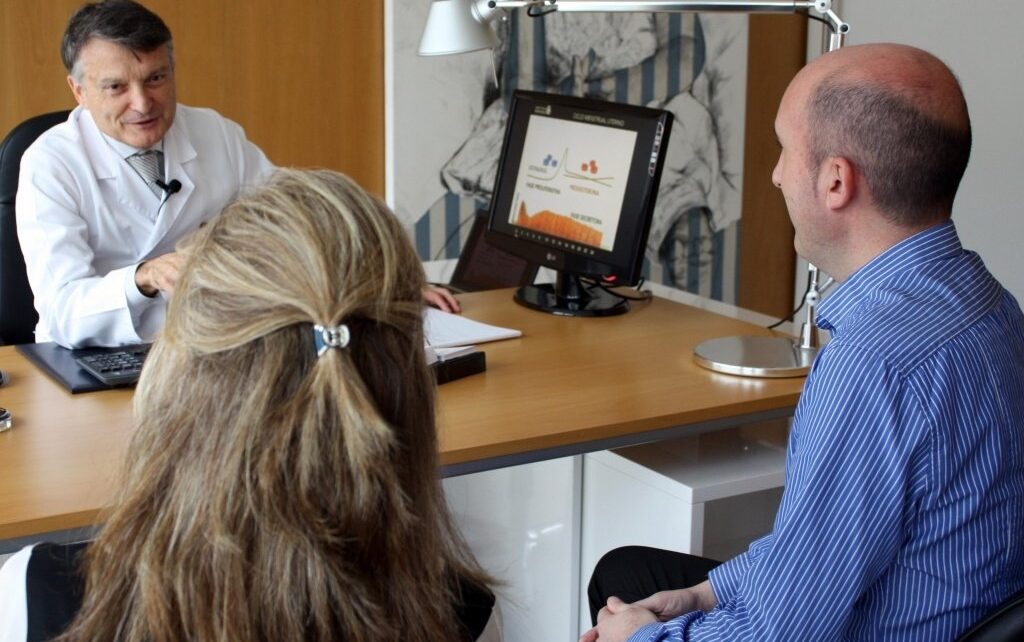
A father’s age and its impact on the health of his children
Anyone who works in the field of fertility puts a great deal of time and effort into working out how to improve pregnancy rates. However, significantly less time is spent thinking about the period that follows gestation or the birth of a healthy child. It’s time to ask ourselves if helping to build healthy and happy families isn’t actually the real goal.
Statistical records in advanced countries clearly indicate that the age at which women have children has progressively increased over the last few years.
Things are not much different when it comes to men. This pattern of behaviour is the same in all developed countries around the world.
Since the trend does not show any signs of reversing, it is essential that we not only ask ourselves what the impact is on our success rates (or, in other words, on the birth of children), and what the impact is on the mother, but also what the impact is on the health of the offspring.
Young women are increasingly looking into the option of freezing their oocytes in order to protect their future fertility and attempt to stop the oocyte ageing biological clock from ticking.
So should men also consider these same concerns? Have the repercussions of a father’s age on his offspring been documented? Are the risks significant enough in order to justify changing the way we do things?
Whilst most chromosomal abnormalities in the embryo originate in the oocyte, the abnormalities in spermatozoon DNA also need to be taken into account since spermatogonial stem cells divide and replicate over a man’s life and there is a risk of error in each division.
So, whilst the cut-off point for defining a ‘father of an advanced age’ has not yet been determined, the progressive increase in genetic risks as a man ages does need to be taken into account. According to ‘Childhood implications of parental aging’ published in June in the Fertility and Sterility Journal (Volume 103, no.6, pages 1379-80), this risk could be linked to neuropsychiatric abnormalities in offspring.
Nonetheless, the absolute risk is still very low. Therefore, advising men to freeze their semen when they are young just to reduce the risk would not seem like a sensible recommendation.
Steps such as these are not considered necessary. Furthermore, it would complicate the logistics of long-term spermatozoa storage in reproductive medicine clinics.
So, based on the above, what advice should we be giving couples?
The existing trend of delaying maternity does not look set to change. The risk of pregnancy loss and chromosomal abnormalities associated with a woman’s age has been clearly and appropriately documented. Furthermore, unlike men, who are continually renewing their spermatozoa, women are born with all the oocytes that they will ever have and this quantity of oocytes diminishes progressively over the years.
Our ability to assess ovarian reserve using diagnostic tools such as antral follicle counts and the anti-Müllerian hormone has improved, but we are still unable to provide personalised predictions of oocyte loss. This, in addition to the decline in the quantity and quality of oocytes as a woman ages, means that many women have chosen to freeze their oocytes.
As doctors, it is our responsibility to inform patients that cryopreserved oocytes are only an opportunity to try for a successful pregnancy. They are in no way frozen offspring nor guaranteed preservation of fertility.
We can conclude that the parents’ age does have a significant impact on offspring. However, there are other things that both men and women can take into account before pregnancy, during pregnancy and as their children develop.
Encouraging patients to have a healthy lifestyle, to refrain from exposing themselves and their offspring to toxic environments and to care for their child’s emotional and educational development is far more important in terms of improving the overall wellbeing of children and families.
Dr Rafael Bernabeu, Medical Director at Instituto Bernabeu.
